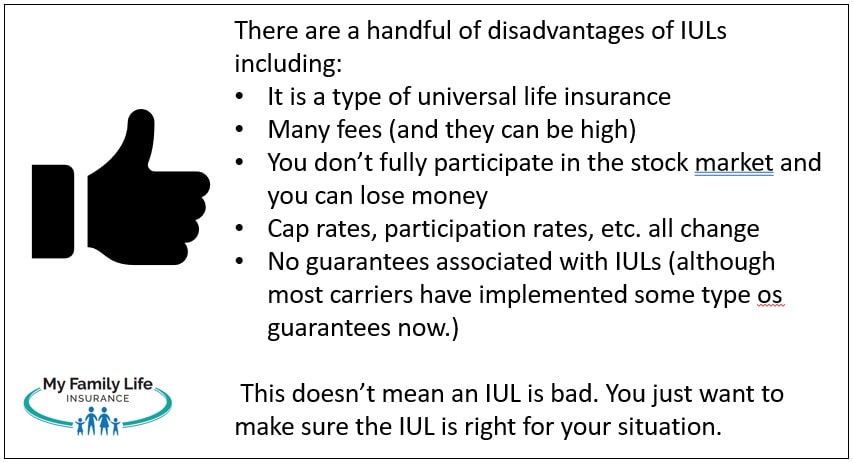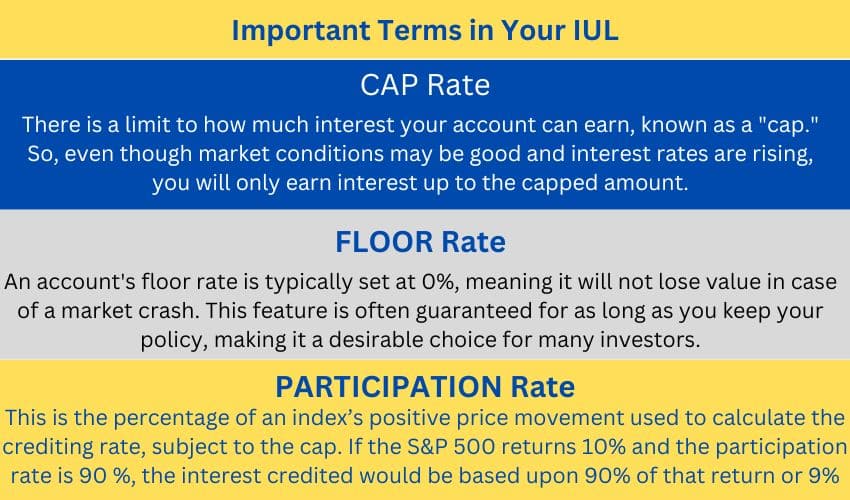All Categories
Featured
Table of Contents
Indexed Universal Life (IUL) insurance is a sort of irreversible life insurance policy policy that incorporates the features of traditional global life insurance coverage with the potential for cash money worth growth linked to the efficiency of a stock exchange index, such as the S&P 500 (IUL growth strategy). Like other forms of irreversible life insurance, IUL gives a death benefit that pays out to the recipients when the insured dies
Cash worth accumulation: A portion of the premium repayments enters into a cash value account, which makes passion with time. This cash value can be accessed or borrowed against throughout the insurance policy holder's life time. Indexing option: IUL policies use the chance for cash money worth growth based on the performance of a securities market index.
Iul Plans
As with all life insurance policy products, there is also a set of threats that insurance policy holders should know before considering this type of plan: Market risk: One of the primary dangers connected with IUL is market risk. Considering that the cash worth development is linked to the performance of a securities market index, if the index chokes up, the money worth may not expand as expected.

Adequate liquidity: Policyholders should have a secure economic circumstance and be comfortable with the exceptional repayment demands of the IUL plan. IUL permits versatile premium payments within particular restrictions, however it's important to keep the plan to ensure it achieves its intended objectives. Passion in life insurance policy protection: People who require life insurance policy protection and a rate of interest in cash value development may locate IUL enticing.
Candidates for IUL should have the ability to understand the technicians of the plan. IUL may not be the very best alternative for people with a high tolerance for market risk, those that focus on low-priced financial investments, or those with even more prompt financial demands. Consulting with a certified monetary advisor that can offer individualized advice is vital prior to taking into consideration an IUL plan.
All registrants will obtain a schedule invitation and link to sign up with the webinar through Zoom. Can not make it live? Register anyway and we'll send you a recording of the discussion the next day.
How much does Iul Tax Benefits cost?
You can underpay or skip premiums, plus you might be able to change your death benefit.
Flexible premiums, and a survivor benefit that may also be versatile. Cash worth, together with prospective development of that worth through an equity index account. IUL vs term life. An option to assign component of the cash value to a set rate of interest alternative. Minimum rates of interest assurances ("floorings"), however there might additionally be a cap on gains, normally around 8%-12%. Built up money worth can be made use of to reduced or potentially cover premiums without subtracting from your survivor benefit.
Insurance policy holders can decide the percent alloted to the dealt with and indexed accounts. The worth of the picked index is taped at the start of the month and compared to the worth at the end of the month. If the index enhances throughout the month, interest is included to the money value.
The resulting interest is included to the cash worth. Some policies calculate the index acquires as the amount of the modifications for the duration, while various other plans take a standard of the everyday gains for a month.
Iul Cash Value
The rate is set by the insurance coverage company and can be anywhere from 25% to greater than 100%. (The insurer can additionally transform the participate rate over the lifetime of the plan.) As an example, if the gain is 6%, the involvement rate is 50%, and the existing cash money value overall is $10,000, $300 is contributed to the money value (6% x 50% x $10,000 = $300).
There are a number of advantages and disadvantages to take into consideration prior to acquiring an IUL policy.: As with common global life insurance policy, the policyholder can raise their costs or reduced them in times of hardship.: Quantities attributed to the cash value expand tax-deferred. The cash worth can pay the insurance coverage premiums, enabling the policyholder to lower or quit making out-of-pocket costs payments.
What should I know before getting Iul Cash Value?
Several IUL plans have a later maturation day than other kinds of universal life plans, with some ending when the insured reaches age 121 or even more. If the insured is still to life during that time, policies pay the survivor benefit (but not normally the cash money worth) and the profits may be taxable.

: Smaller sized policy face values don't supply much benefit over normal UL insurance coverage policies.: If the index goes down, no rate of interest is attributed to the cash value.
With IUL, the goal is to make money from upward movements in the index.: Because the insurance policy company just purchases alternatives in an index, you're not straight bought supplies, so you do not profit when companies pay returns to shareholders.: Insurers fee fees for managing your money, which can drain pipes cash money worth.
Can I get Iul Investment online?

For most individuals, no, IUL isn't much better than a 401(k) - IUL vs whole life in regards to saving for retirement. Many IULs are best for high-net-worth people searching for ways to minimize their gross income or those who have maxed out their various other retired life options. For every person else, a 401(k) is a better investment automobile since it doesn't bring the high charges and costs of an IUL, plus there is no cap on the amount you might earn (unlike with an IUL plan)
While you may not shed any type of money in the account if the index goes down, you won't earn passion. If the market turns bullish, the profits on your IUL will not be as high as a common investment account. The high price of costs and costs makes IULs costly and substantially much less economical than term life.
Indexed universal life (IUL) insurance coverage uses money value plus a survivor benefit. The money in the money value account can earn interest via tracking an equity index, and with some typically allocated to a fixed-rate account. Indexed universal life policies cap just how much cash you can collect (commonly at much less than 100%) and they are based on a possibly volatile equity index.
How can I secure Iul Tax Benefits quickly?
A 401(k) is a much better choice for that function because it does not lug the high fees and premiums of an IUL plan, plus there is no cap on the quantity you might make when invested. Many IUL policies are best for high-net-worth people seeking to lower their gross income. Investopedia does not give tax obligation, financial investment, or monetary solutions and recommendations.
If you're thinking about purchasing an indexed global life plan, initial talk with a monetary expert who can explain the nuances and provide you an exact image of the actual possibility of an IUL policy. Ensure you recognize how the insurance company will compute your rate of interest, earnings cap, and fees that could be assessed.
Latest Posts
Indexed Universal Life Insurance Good Or Bad
Index Universal Life Insurance Vs Whole Life
Universal Life Insurance Cash Surrender Value